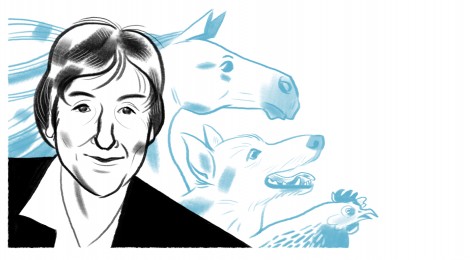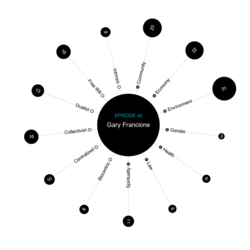
Episode 42: Gary Francione
Gary L. Francione is an animal rights activist, proponent of veganism, Professor of Law and Scholar of Law and Philosophy at Rutgers. Previously he taught at the University of Pennsylvania, worked as an attorney in New York, and clerked for Sandra Day O’Connor. He is the author of several books including Rain Without Thunder: The Ideology of the Animal Rights Movement and, more recently, co-author of The Animal Rights Debate: Abolition or Regulation.
For all of the talk of biocentrism and anthropocentrism that dominated many of the early episodes of The Conversation, animals have not been a major theme within the project. Chris McKay, Robert Zubrin, and David Keith all discussed animals in passing, but for Gary they are central to a discussion of what he considers the biggest issue of our era: the tension between moral realism and moral relativism. Questions of nonviolence, commodification, and empathy pervade our conversation, but Gary pairs his abstract notions with a lot of concrete examples—this episode deals with the visceral immediacy of everyday life and doesn’t threaten to float away in a philosophical balloon. I think you will like this episode, just as I think it will challenge you.
In terms of connections, there are points where Gary could almost be responding directly to Richard Saul Wurman’s moral relativism. Lawrence Torcello will be on your mind, not merely because I mention him in the introduction, but because Gary’s conversation provokes questions of relativism, pluralism, and how we can work towards the broader good.
2/18/13 – Gary Responds
Occasionally we are fortunate enough to have an interviewee contact us after an episode and extend The Conversation further. Gary sent me this note in response to the discussion Neil and I had at the conclusion of his interview. In it, he develops six points:
- Veganism is necessary but not a sufficient condition for nonviolence.
- A perfectly nonviolent life is impossible, thus “purity” is being incorrectly applied by Neil.
- His thinking is informed by Jainism but rooted in more general philosophical concepts.
- Utilitarianism is less pragmatic than veganism as a tool for change.
- There is a tipping point for social acceptance of ideas, including veganism.
- Choosing a vegan lifestyle is easy, not difficult.




Is it possible to express the value of an individual or sentient being if you do not believe sentient beings have spirits or souls? Do you discuss them with cold, scientific violence if you do? Each speaker endeavored to quantify or describe goods and morals and violence while skirting spirituality, a unified perspective, even while parsing off bits of Christian text. The very proposition of giving weight to a conceptual soul through the scientific idea of biologically programmed morality caused a swift retraction by all parties.
Is science then compatible with morality, and does morality have value if it has no higher source than collective opinion? Wouldn’t this make criminals forerunners of other cultures? It seems this inability to ascribe a source to morality dismantles the entire system behind the topic of conversation, at least until a source of morality can be ascribed. Simply asked, can you correct the pitfalls of postmodernism without a source of morality? Is the value of nonviolence a sufficient source – can a single value act as verifiable source of morality with no other backing without also giving credence to someone who chooses violence as their source of morality?
I’m wondering too if this wasn’t already covered earlier in the episode.
DS: Of course it is possible to value individuals without believing in souls. I know many many people who do. I also know far too many people who think it is just fine to torment other beings because they supposedly do not have a soul. Why would a supposed absence of a soul have anything to do with non-violence in a world of ethics. It isn’t relevant. This was an excellent conversation with Gary Francione and frankly it is impossible to embrace morality without embracing veganism.